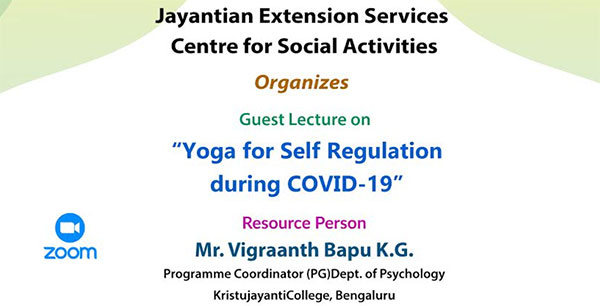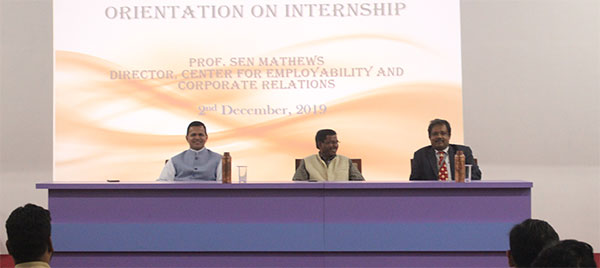
Guest Lectures
Guest Lecture on "Yoga for self-regulation during Covid-19"
Date: 26/02/2021
Beneficiaries: I Sem BA/BBA/B.Com
Resource Persons: Mr.Vigraanth Bapu K.G., Programme Coordinator, Department of Psychology, Kristu Jayanti College, Bengaluru.
The Speaker of the programme Mr.Vigraanth Bapu K.G discussed about how we can achieve self – regulation through yoga. He gave the keynotes on why yoga is important during Covid time and discussed about the practices of managing behaviour & reaction to feelings and the things happening around us. Also, discussed about the effect of covid on student life like increased screen time, reduced physical activity, change in sleep & Eating pattern and interpersonal problem.
Sir also explained why we need self-regulation and how self-regulation will be a perfect solution. Enlightened the students by explaining the basics of yoga and how one can improve their brain function through it. Enlightened the participants by explaining the importance of yoga in a pandemic situation to take care of our mind, body and soul which showed a new path to the students and radiated a source of energy within the participants by his all words of wisdom.
The session was very insightful and interesting. It was a delight to the participants and students alike to be a part of such an enlightening celebration. The session ended by clarifying the queries posted by the students.

Panditha Bhashana Series IV
Date: November 07, 2020
Kristu Jayanti College of Law organized Panditha Bhashana Series 4 an interactive session on ‘Developing Reading Skills’ on 7th November, 2020. Prof. I. Stephen, Associate Professor, Department of English (PG), Kristu Jayanti College (Autonomous), Bengaluru was the chief guest of the day
Prof. Stephen led the students through a truly enlightening session and affectionately referred to the students as “budding legal luminaries”. Prof. Stephen described the importance of reading and the necessity of an adequate vocabulary. He also explained that true communication is the process of meaningful interaction between human beings and elucidated the most effective methods of reading and comprehending. Prof. Stephen explained the necessity of maintaining a suitable framework while reading and the importance of keeping in mind the context while reading. Mr. Stephen expressed the need for motivation, excellent concentration and good study techniques to enhance the effectiveness of reading and information retention. Prof. Stephen also expounded that it would be incomplete to explain reading skills while neglecting its counterpart- writing. He helped us comprehend that good writing will convince the reader of the writer’s argument. He also taught the MACJ method of writing, where the initial stage of writing is sampling, jotting down points and ideas. The next stage involves creating a basic framework to ensure the accurate flow of the argument. The third stage is fleshing out one’s argument in a creative manner based on the framework made. The final stage is the editing which must be done ruthlessly to ensure that a reader’s attention is kept at all times.
Overall the students gained insights on Developing Reading Skills with the help of various reading strategies and their applications.
Panditha Bhashana Series III
Date: October 28, 2020
On October 28th, 2020 under the Panditha Bhashana Series-3 organized by the Kristu Jayanti College of Law, for B.A. LL.B first year students, Prof. S. J. Michael articulated the concept of state and sovereignty virtually via zoom platform which commenced at 9:15am. Prof. S. J. Michael, HOD of Political Science and Coordinator of Department of Social Sciences and Languages of Kristu Jayanti College (Autonomous) was the resource person for the day.
Prof. S. J. Michael started off by explaining the concept of state. The word ‘State’ was derived from the Latin word “Status’, Greek word ‘Polis’ and the Roman word ‘Civitus’. The father of modern Political Philosophy and Political Science Niccolo Machiavelli was the first person to use the term ‘State’ in his book ‘The Prince’.
There are four elements of State - Population, Territory, Government and Sovereignty. Then we were introduced to the concept of Origin of State, where Sir discussed theories related to the same and gave a comparison of State and Society.
In the later part of the lecture, Sir discussed Sovereignty. The term is derived from the French word ‘Souverainnate’ meaning one who is superior to others. It is also derived from the Latin word ‘Superannus’ meaning supreme. Sovereignty is possessed alone by the State and it is one of the four elements of the State. This was followed by learning the features and kinds of Sovereignty in detail.
The whole session was very interactive. Prof. Micheal was constantly asking questions to the students and they actively responded to all his questions. The session reached the end with a doubt-clearing session where the students posed their queries. The session was very insightful and valuable to all the students. It was very well presented as the resource person was very knowledgeable and provided us with informative tips. The discussion was quite interesting as the concepts were discussed with the help of both theory and practical knowledge.
Panditha Bhashana Series II
Date: October 24, 2020
Kristu Jayanti College of Law organized Panditha Bhashana Series 2 an Interactive session on ‘Business Environment in COVID Era’ on 24th October 2020. Prof. C. Surendranath Reddy, Head, Department of Management, Kristu Jayanti College (Autonomous), Bengaluru, was the Chief Guest for the day.
The session was divided into two segments- (i) Understanding what are business environment, and (ii) Industries and the effects of the pandemic.
The session started with the quote: “Nothing is permanent except change”, quoted by Heraclitus, a Greek philosopher, denoting the dynamic environment we exist in. Prof. Surendranath explained in detail about businesses and how their environment affects their functioning, focus areas of businesses to attract more customers and measures to deal with the problems of the business environment. The pandemic has severely affected the small businesses and has turned out to be a blessing for online businesses. The businesses today have a highly volatile, uncertain, complex and ambiguous environment (VUCA). The recent pandemic has made the conditions worse for retail shops and small businesses. Despite these negative impacts, some businesses have witnessed a drastic growth and momentum. These are the online delivery platforms and OTT platforms. Telecom industry has proven to be the most benefited industry amidst the pandemic as more and more people have been locked in their homes and are in need of such services. The worst hit industries are waiting for things to get back to normal soon, so that they can continue with their business activities. The webinar ended with the doubt clearing session where the students were able to interact with the professor. The session helped the participants to get insights about the impact of the pandemic on the various business sectors the country
Panditha Bhashana Series I
Date: October 20, 2020
A special lecture was delivered by Dr. Jonas Richard and Dr. Birudu Raju, to Kristu Jayanti College of Law students, Bengaluru, regarding Conflict Theory.
The Lecture started with an interactive question session and the enthusiastic students were filled with curiosity. After the questions, there was an introduction to Lewis Coser’s interpretation of Conflict Theory which said:-
1. There is the conflict of war, but there is also the conflict that we find in our daily lives and relationship.
2. The existence of possibilities of different paths opens up opportunities for negotiation and different types and levels of conflict.
Concerns of General Theories are:-
• Unequal Distribution of scarce Resources
• Power
• Class
• Status
Theories of Social Stratification were also mentioned such as:-
1. Evolution Theory
2. Political Theory
3. Occupation Theory
4. Traditional Theory
5. Guild Theory
6. Religious Theory
Conflict theory, first purported by Karl Marx is a theory that society is in a state of perpetual conflict because of competition for limited resources. He was centrally concerned with classes and the dialectics of capitalism. He argued that capitalism would produce its own gravediggers by creating the conditions under which class consciousness and a failing economy would come into existence. He also stated that in between this junction, the working classes came in to existence.
Social Class was divided as such;
• Rise of Slavery system
• Guild System
• Bourgeoisie System
• Middle Class
• Subdivision of Middle Class
Towards the end of the lecture, the resource persons explained about Law and Conflict. It is the inter-relationship of Law and Criminology, which says that those in society, who possess the social and economic power i.e. the ruling class, define the anti-social behavior and how the ruling classes misuse the criminal law and the criminal justice system to protect their interest and to control the lower class.
This was classified into two types of deprivation:-
1. Absolute Deprivation
2. Relative Deprivation
The session proved to be very insightful and enlightening for the students and the “conflicts” in their mind regarding the subject matter were resolved successfully.
Topic: Basics of Financial Accounting
Date: 19th September 2019
Time: 11.00 A.M. to 12.45 P.M.
Participants: Law Faculties
Name and details of the Resource Person: Prof. Lourdu Nathan.F B.Com., MBA, M.Com., M.Phil., (Ph.D.) Kristu Jayanti College.
Participants: BBA LL. B and B. Com LL. B 1st semester students.
Course Content
Sir started with introductory lecture, introduction to the course and lecturer, Conceptual definition of accounting, Financial accounting and reporting, Financial information, Double Entry Accounting, Structure and content of financial statement in general and Balance Sheet.
Course Objectives
• Explain the concept and role of accounting and financial reporting in the modern market economy.
• Understanding the basic accounting concepts, accounting principles and techniques of posting basic business changes.
• Explain the structure and content of financial statements.
Hindu Marriage Act and Hindu Succession Act.
Date: 2st November 2019
Time: 2.30 A.M. to 4:30 P.M.
Classes attended: law students of 5th Semester and all the Faculties in Law.
Number of beneficiaries: 80
Objectives: Imparting knowledge about Hindu Marriage Act and Hindu Succession Act.
Sir began his lecture by explaining the word Hindu Who is Hindu, according to Hindu Marriage Act, which includes Hindu by birth and conversion, Sikhs, Buddhists and Jains .he also gave the detailed explanation about the Essential Conditions & Ceremonies for a Hindu Marriage, Grounds for Divorce (for wife & husband), Judicial Separation, Restitution of Conjugal Rights, Marrying legally in India, How to get divorce in India?, Void and Voidable Marriages, Nullity of Marriage, Validity of Marriage, Landmark Judgments on divorce, maintenance in India...Maintenance and Alimony, Custody of Children After Divorce, Jurisdiction of Courts, Punishment for Bigamy etc. Sir also discussed about the rights of Hindu daughters over ancestral property under Hindu succession act 1956 .he also emphasized on judgment of Supreme Court of India in the case of Prakash & ors. vs. Phulavati & Ors. (2016)2 SCC 36 in which Apex Court of our country held that the rights under the amendment are applicable to living daughters of living coparceners as on 9-9-2005 irrespective of when such daughters are born.
The lecture was followed by an interactive session with students as well as faculty members. Students were overwhelmed to gain the knowledge of law.
INTERNSHIP ORIENTATION
Topic: Orientation on Internship
Date: 02nd December 2019
Time: 11.00 A.M. to 12.45 P.M.
Participants: Law Students BBA LL. B, B.Com LL.B, BA LL.B
Name and details of the Resource Person: Prof. Sen B. Mathews B.Com., DAE, MBA,PGDPM & IR,(Ph.D) Kristu Jayanti College, Director, Centre for Employability & Corporate Relations(CECR) Kristu Jayanti College.
In this program prof. Sen B. Mathews explained the students of Law college about the importance of internship for a professional course like Law. He explained the initial procedure required for getting an internship opportunity. This program was an eye opener for 1st year students. Main motive of the program was to educate the students how to land in a job after the LL.B Degree.

Departmental Activities
goto QuickLinks
ABOUT
ACADEMICS
RESEARCH
CAMPUS
Explore 360° View